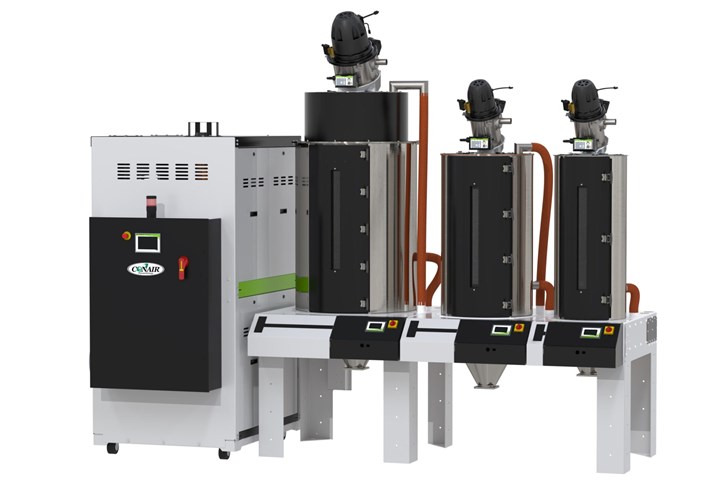AI Manages Resin Drying Airflows and Throughputs for Energy Savings
NPE2024: Optional feature automates the process of maintaining process-ready resins at perfect temperatures and varied throughputs, while preventing overdrying and realizing significant energy savings.
Share
ResinWorks with Optimizer automates the tricky process of maintaining process-ready resins at perfect temperatures and varied throughputs, while preventing overdrying and realizing significant energy savings. It is a new optional AI-driven feature for Conair’s ResinWorks centralized, multihopper drying system
Typical ResinWorks systems rely on operators to physically actuate a manual damper to manage and balance airflows into to each active hopper. While such balancing is mechanically simple and very reliable, it is generally based on the use of fully loaded hoppers and a predicted throughput rate for each material. Therefore, any changes or interruptions in hopper usage, resin mass flow through each hopper or process resin demand can introduce imbalances that are difficult for operators to manually detect and correct.
The Optimizer package for ResinWorks changes all that. As Conair explains, the Optimizer starts with the same conditions as a manual operator would: a required resin delivery temperature and predicted throughput of each resin through each hopper. In operation, the Optimizer monitors overall airflow, first ensuring that only active hoppers are served. Then, its AI-driven logic optimizes airflow through each active hopper based on changes in mass flow and temperature. Once material at the bottom of the hopper achieves the proper temperature, the Optimizer logic holds it steady, while incrementally adjusting airflow through the rest of the hopper to match the actual processing rates, incoming material condition and material drying requirements.

Rigorous testing has shown the Optimizer to be versatile and highly reliable under changing conditions typical of an active plastics processing plant. Not only can its AI-driven logic efficiently dial back and rebalance airflows for unused hoppers or reduce airflows for less-than-full hoppers but it can also boost airflows — and alert process operators — when process resin rises unexpectedly, Conair says .
Conair also says the ResinWorks with Optimizer has demonstrated energy savings of 10 to 40% in virtually every situation. The company notes that the airflow detection and management system used in ResinWorks Optimizer is designed for reliability. It does not require complex sensors (such as pitot tubes, orifice plates, velocity probes) that are vulnerable to breakage, inaccurate readings or constant calibration in industrial environments. Instead, its proprietary logic realizes continuous energy savings that eliminate the potential cost and maintenance burden of similar systems.
The Optimizer artificial intelligence package may be ordered with new ResinWorks multihopper carts from the factory. Retrofits are possible and involve removal and replacement of the manual airflow lever and valve with new hardware, plus a software upgrade to an existing Conair DC-B “common” control.
Conair notes that most processors who invest in the ResinWorks with Optimizer upgrade can expect payback within one year, even with process energy savings as low as 10%
Related Content
-
'Smart,' Moisture-Based Drying Technology Enhanced
At NPE2024, Novatec relaunches DryerGenie with a goal to putting an end to drying based on time.
-
Drones and Injection Molding Ready for Takeoff
Drones and unmanned aerial vehicles (UAV) are approaching an inflection point where their production volumes — and functionality — will increasingly point to injection molding.
-
What to Look for in High-Speed Automation for Pipette Production
Automation is a must-have for molders of pipettes. Make sure your supplier provides assurances of throughput and output, manpower utilization, floor space consumption and payback period.









